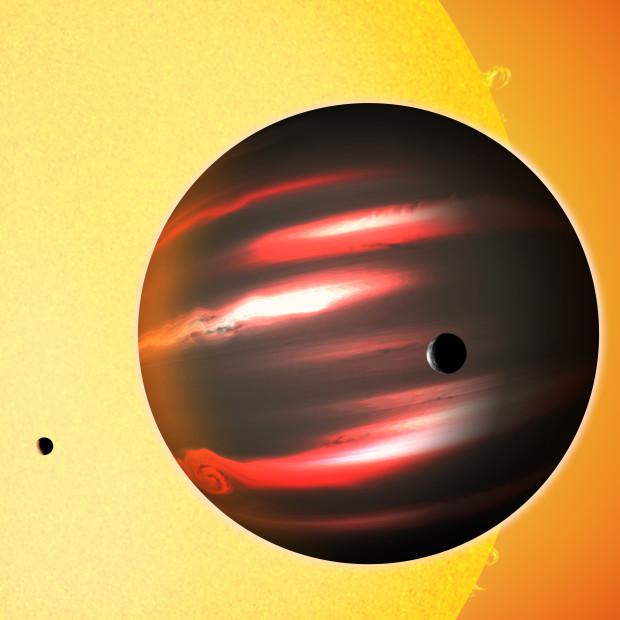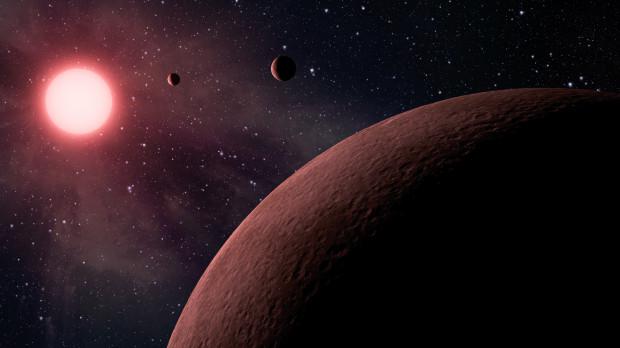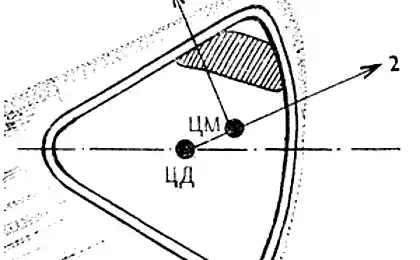661
The darkest planet with all that we know
Night on Earth are not the most tёmnye
«TrES-2b» sounds like something taken straight out of a science fiction film. This is the darkest planet ever open person, it almost does not reflect light the nearest star. Only some areas of the planet glow dark red because it is incredibly hot. In other words, the planet quite unsuitable for life.
Are you afraid of the dark? Then you probably should not go to TrES-2b. Besides the fact that it is a giant ball extremely hot gas, the planet is at a distance of 750 light years from Earth, is completely devoid of air, breathable, plus it blacker than any substance known to man. So your night-light will not save you.
Discovered in 2011, the Kepler space observatory, TrES-2b is outside the solar system and the planet from the star removed at 4, 8 million kilometers. It is about the size of Jupiter, the temperature on its surface reaches 980 degrees Celsius.

That is, TrES-2b is ideal to escape from the cold of deep space ... once and for all.
Despite the heat, TrES-2b - the darkest planet ever detected. Only some of its part of the world, and are similar to the embers, but most of the surface of the planet blacker than the blackest acrylic paint.
This chilling darkness arose because of the low albedo of the planet (the amount of light reflected from the surface). At that time, as the Earth's albedo is 30%, the albedo of the Sun is close to 100%, TrES-2b reflects only one percent of the light nearest star. And scientists still do not know exactly why. We only know that it has something to do with the lack of clouds on TrES-2b. For example, on Jupiter there are clouds of ammonia that reflect sunlight, but TrES-2b is too hot for the appearance of the clouds. As for the atmosphere of the planet, the researchers believe that it may consist of chemicals that absorb light. Such as gaseous sodium, potassium or titanium oxide. Or maybe there is something so rare, what researchers have not yet had time to think.
via factroom.ru

«TrES-2b» sounds like something taken straight out of a science fiction film. This is the darkest planet ever open person, it almost does not reflect light the nearest star. Only some areas of the planet glow dark red because it is incredibly hot. In other words, the planet quite unsuitable for life.
Are you afraid of the dark? Then you probably should not go to TrES-2b. Besides the fact that it is a giant ball extremely hot gas, the planet is at a distance of 750 light years from Earth, is completely devoid of air, breathable, plus it blacker than any substance known to man. So your night-light will not save you.
Discovered in 2011, the Kepler space observatory, TrES-2b is outside the solar system and the planet from the star removed at 4, 8 million kilometers. It is about the size of Jupiter, the temperature on its surface reaches 980 degrees Celsius.

That is, TrES-2b is ideal to escape from the cold of deep space ... once and for all.
Despite the heat, TrES-2b - the darkest planet ever detected. Only some of its part of the world, and are similar to the embers, but most of the surface of the planet blacker than the blackest acrylic paint.
This chilling darkness arose because of the low albedo of the planet (the amount of light reflected from the surface). At that time, as the Earth's albedo is 30%, the albedo of the Sun is close to 100%, TrES-2b reflects only one percent of the light nearest star. And scientists still do not know exactly why. We only know that it has something to do with the lack of clouds on TrES-2b. For example, on Jupiter there are clouds of ammonia that reflect sunlight, but TrES-2b is too hot for the appearance of the clouds. As for the atmosphere of the planet, the researchers believe that it may consist of chemicals that absorb light. Such as gaseous sodium, potassium or titanium oxide. Or maybe there is something so rare, what researchers have not yet had time to think.
via factroom.ru
"The thousand test" - one of the toughest tests in the spiritual world
8 coolest photos of animals from the community «National Geographic»























